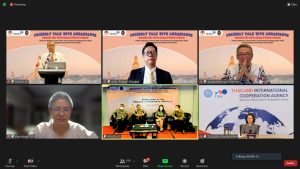
International Conference on Population and Development (ICPD) in Cairo in 1994 presented human rights recognized under international law, one of which was about the recognition of reproductive health rights.
Gender equality in reproductive health is the family’s responsibility in terms of decision-making regarding the number of families, birth spacing, and time to have children, as well as making decisions on the choice of contraceptive method to be used. It must be discussed with the partner in advance whether the husband or wife will use contraception. The existence of the male involvement in Family Planning Program, namely Vasectomy, is one of the efforts to increase the participation of men in contraception as part of the family planning program.
During the Covid-19 pandemic, many women and families tend to cope with stress. This serious issue needs more attention from many parties or stakeholders, including the government.
There are 12 reproductive rights formulated by the International Planned Parenthood Federation (IPPF) in 1996, among others:
- The right to life. Every woman has the right to be free from the risk of death due to pregnancy.
- The Right to Free-Choice and Security of The Person. Every individual has the right to enjoy and control their sexual and reproductive life, every pregnancy is wanted.
- The right to equality and to be free from all forms of discrimination
- The right to privacy.
- The right to freedom of thought.
- The right to information and education.
- The right to health care and health protection
- The right to the benefits of scientific progress.
- The right to freedom of assembly and political participation.
- The right to be free from torture and ill-treatment.
The National Population and Family Planning Board of The Republic of Indonesia (BKKBN) together with line Ministries/Institutions, attempts to implement those rights into 8 family functions in terms of parenting styles, namely religious functions, socio-cultural, love, protection, reproduction, socialization and education, economy, and environmental development.
On April 25th, 2022, The National Population and Family Planning Board of The Republic of Indonesia carried out the Ambassador Talks with the Royal Thai Embassy on the theme “Gender Perspective in Sexual Health, Family Planning, and Reproductive Health: Sharing Experience and Policies from Thailand”. This event was held virtually by zoom application and youtube.
Some of the resources persons fulfilled this event namely Mr. Prapan Disyatat, Ambassador –designated of the Kingdom of Thailand to the Republic of Indonesia; Mr. Rachmat Budiman, Ambassador Extraordinary and Plenipotentiary of Indonesia to the Kingdom of Thailand, Permanent Representative to the UNESCAP; Prof. Rizal M Damanik, Ph.D., Deputy for Training, Research, and Development of BKKBN; Dr. Kanokwan Tharawan, Ph.D., from the Insitute for Population and Social Research, Mahidol University, Thailand; Mrs. Arunee Hiam, from Thailand International Cooperation Agency.